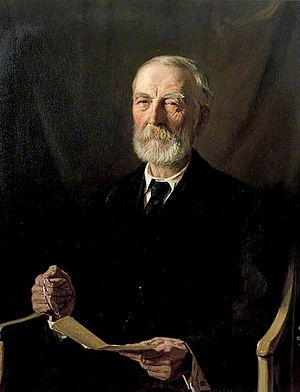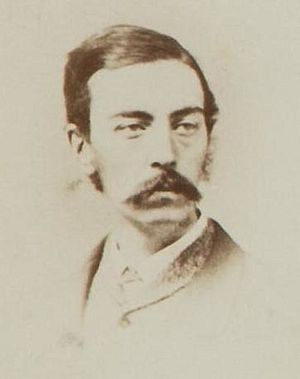Donald Mackay, 11th Lord Reay facts for kids
Quick facts for kids
The Lord Reay
|
|
|---|---|
 |
|
| Governor of Bombay | |
| In office 1885–1890 |
|
| Monarch | Victoria |
| Preceded by | Sir James Fergusson, Bt |
| Succeeded by | The Lord Harris |
| Under-Secretary of State for India | |
| In office 11 March 1894 – 21 June 1895 |
|
| Monarch | Victoria |
| Prime Minister | The Earl of Rosebery |
| Preceded by | George W. E. Russell |
| Succeeded by | The Earl of Onslow |
| Personal details | |
| Born | 22 December 1839 The Hague, Netherlands |
| Died | 1 August 1921 (aged 81) Carolside, Berwickshire, Scotland |
| Nationality | British |
| Political party | Liberal |
| Spouse | Fanny Hasler |
Donald James Mackay, 11th Lord Reay (born December 22, 1839 – died August 1, 1921) was an important person in British politics. He was born in the Netherlands but became a British citizen. He worked as a government official and was a member of the Liberal Party. In the Netherlands, he was known as Donald Jacob, Baron Mackay.
Who Was Donald James Mackay?
Donald Jacob Mackay was born in The Hague, Netherlands. His father was Aeneas Mackay, 10th Lord Reay. His father was also a member of the Dutch Parliament. His mother was Maria Catharina Anna Jacoba Fagel. Her family was related to the Boreel baronets.
His Work in Politics
Donald Mackay became Lord Reay in 1876 after his father passed away. He officially became a British citizen in 1877. In 1881, he was given the special title of Baron Reay. This title was part of the Peerage of the United Kingdom, a system of noble ranks.
From 1885 to 1890, he served as the Governor of Bombay. Bombay was a very important part of British India at that time. During his time there, he received two high honors: the Knight Grand Commander of the Most Eminent Order of the Indian Empire in 1887 and the Knight Grand Commander of the Most Exalted Order of the Star of India in 1890.
After returning to Britain, he continued his political career. From 1894 to 1895, he was the Under-Secretary of State for India. This role meant he helped manage affairs related to India from Britain. He also represented Britain at the Second Peace Conference in 1907. This conference led to the signing of the Hague Convention. These agreements aimed to make rules for war and peace.
Lord Reay also played a part in a big political event in 1909. The House of Lords, a part of the British Parliament, rejected a new government plan called the People's Budget. This was unusual because the House of Lords usually did not block money bills.
Other Important Roles
Besides his political jobs, Lord Reay held many other important positions. He was the Rector of St Andrews University from 1884 to 1886. A rector is like a head or leader of a university. He also chaired the London School Board from 1897 to 1904. This board was in charge of schools in London.
He was the President of the Royal Asiatic Society for many years (1893–1921). He also led University College, London. In 1902, he became the first President of the British Academy, a group that supports learning and research.
Lord Reay was also the Lord Lieutenant of Roxburghshire from 1892 to 1918. This is a special role representing the monarch in a county. In 1906, he became a member of the Privy Council. This is a group of advisors to the monarch. In 1911, he was made a Knight of the Thistle, a very high honor in Scotland.
In 1901, the University of Glasgow gave him an honorary doctorate degree. This is a special award given to people who have achieved great things. He also kept in touch with the Dutch community. In 1921, he met the famous Dutch writer Louis Couperus in London.
His Family Life
In 1877, Lord Reay married Fanny Georgiana Jane Hasler. They did not have any children. He passed away in August 1921, when he was 81 years old. Since he had no children, his special title of Baron Reay (from 1881) ended with him. His Scottish title, Lord Reay, passed to his cousin, Eric Mackay.
 | Toni Morrison |
 | Barack Obama |
 | Martin Luther King Jr. |
 | Ralph Bunche |


